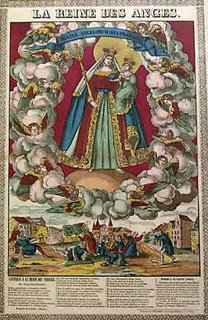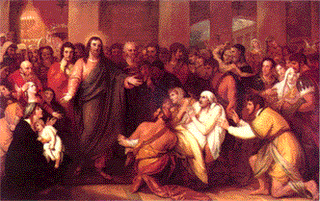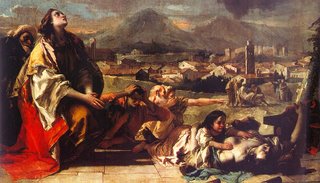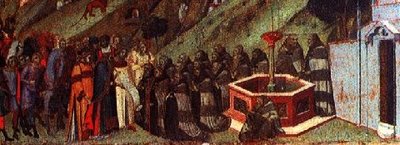 ST. THOMAS OF VILLANOVA
ST. THOMAS OF VILLANOVABiographical sketch after Prof. Plinio Corra de Oliveira (www.traditioninaction.org)
St. Thomas of Villanova, renowned for the works of charity and love for the poor in the early 16th century, Germany and Spain presented a curious contrast: The first was divided, scandalized, and perverted by an apostate Augustinian monk: Luther. The latter was elevated and sanctified by another Augustinian monk, St. Thomas of Villanova. St. Thomas was born on September 18, 1488 at Fuentellana, Spain, the son of a noble but impoverished family. His parents were extremely virtuous and transmitted to him their love for the poor. His mother had received the gift of miracles. The boy was the worthy fruit of such saintly parents. After a virtuous childhood in Villanova, he graduated with high honors from the University of Alcal. At age 28 he joined St. Augustine friars at Salamanca and took his vows on November 25, 1517, the same year of Luthers apostasy. At Salamanca he taught Scholastic Theology, and soon began to preach in pulpits throughout Spain. He dedicated his life to the confessionary and to the pulpit. His sermons were so persuasive that he was named the court preacher of Emperor Charles V and one of his councilors of state. It is said that the Charles V never denied anything to St. Thomas because as the Emperor affirmed he had the gift to move hearts. He was offered the See of Granada, but refused the position. Years later, in 1544, he was obliged under obedience to accept the Archbishopric of Valencia. At that time, the Kingdom of Valencia was suffering from a severe drought. When it was announced that St. Thomas had been chosen the new Archbishop, rain poured abundantly, a sign of the days of grace and redemption to come. In fact, this rain summarizes well the tenure of St. Thomas of Villanova, who became known as Almsgiver and Father of the Poor for his charity, and model of Bishops for his administration and laws. He made a gradual and steady reform of the Clergy, and then extended it to all the faithful. He continued his mortified life, always seeing in the poor his most precious treasure. He was munificent with all but very parsimonious with himself to the point that he wore the same habit that he had received in the novitiate. Once he was accused of avarice by a tailor who received an old coat for him to mend. Notwithstanding, some time later St. Thomas gave 150 silver coins as dowry for the tailors daughters.
Several hundred poor came to St. Thomas door each morning and were given meals, wine and money. His charity was often accompanied by miracles of healing the sick, the multiplication of food and extraordinary conversions. His ecstasies were so common that at times he described them in his sermons on the Transfiguration.
After 11 years of his episcopate, St. Thomas fell gravely ill and died September 8, 1555, the day of the Nativity of Our Lady. In his death agony, he gave the bed in which he was laying to a poor man. It was the last thing he had. St. Thomas of Villanova left a great number of sermons and theological writings; his grandiose style is reminiscent of St. Bernard.
Comments of Prof. Plinio:
This is not a very easy selection to comment on since it primarily reports facts about St. Thomas of Villanova that are characteristic of many saints. They are admirable and praiseworthy, but a little too generic and repeat what we hear about the others. I limit myself, therefore, to comment on some more distinctive points here and there for our meditation.
Charles V making peace with the German Protestant princes at Augsburg, 1530.
First, it is remarkable the fact that Charles V chose St. Thomas of Villanova as a preacher and councilor. He was a person who in many ways directed the conscience of the Emperor. You see the finger of Divine Providence directing this great statesman.
Charles V, Emperor of the Holy Roman German Empire, a man over whose domains the sun never set, was an extraordinarily important man. He continued the vocation of the Hapsburgs of the House of Austria. There is a text by Mary de Agreda describing the designs of Providence for the House of Austria and all the graces God gave the Hapsburgs to fulfill them. It is very beautiful to see how Divine Providence assisted the realization of those designs by sending St. Thomas of Villanova to be the court preacher and councilor to Charles V.
Charles V, we must add with sadness, did not entirely correspond to those plans of God. He had a saint as a councilor, but he was a man whose softness and spirit of tolerance permitted Protestantism to expand in his lands. It is true that he had many different enemies to fight. One of them was the league formed by Muslim Turkey and Catholic France, which also became indirectly responsible for the expansion of Protestantism.
But Charles V had long periods of peace when he could have opposed the expansion of Protestantism. His famous temporizations have made him the subject of strong, objective critiques by Church historians.
But he ended his life well. He left aside all his possessions and goods and retired to a monastery as a penitent. He spent his last years there living a life that edified all Christendom. Did the good counsels of St. Thomas of Villanova finally move his heart? He used to say that St. Thomas had the gift of moving hearts. Did St. Thomas also bend his own heart of iron? It is a point to consider.
An angel holds a portrait of Emperor Charles V, who died a penitent in the monastery of San Yuste in Spain.
Someone could object: Why do you say that he had an iron heart? A man who makes concessions is a soft man and cannot be consider a man with an iron heart. I would answer that long experience of life has shown me that nothing is harder to change than the heart of a soft man and make him an energetic man. It is harder to make a soft man energetic than to make an energetic man become soft. I think that a saint who could have made Louis XVI lose his softness would have performed a supernatural exploit greater than one who would convince Louis XIV to refrain from using force. So, the change of Charles V, who went to a monastery to make penance, may have been due to a good counsel of St. Thomas of Villanova.
Second, it is interesting to see that St. Thomas had so many ecstasies that he used to speak about them in his sermons. It is admirable to see how he reported, sincerely and nobly, without vanity, the manifestations of grace in his soul from the pulpit. Only a truly superior soul can do this because he understands that grace does not rely on his personal merit but only on the largesse of God.
This attitude is the opposite of a certain Calvinist way of understanding humility that has infiltrated many Catholic milieus. According to it, an individual is proud if he ever praises himself or lets someone else know of his qualities or gifts, because humility would always demand that he hide such things. This is not always true. It is a simplified picture.
I know, of course, that it can be dangerous to tell a person he can praise his own qualities. Often it happens that the person does not have an objective view of himself, but exaggerates his qualities and becomes proud. I know this, and I agree that we must be careful about encouraging this kind of pride.
But this is different from obliging everyone to hide his qualities in the name of humility. You can see in the life of St. Thomas of Villanova how he made a beautiful and natural manifestation of the graces he received and the marvelous things God did in his soul. He could talk about them even in a sermon because he was detached from them and was glorifying God alone, and not himself.
In the richness of the Catholic Church, we can find the models for both the rule, which is to be silent about ones qualities, and also for the exception, which is to praise ones own graces and qualities in order to honor God.
This is another beautiful facet of the life of St. Thomas of Villanova.
Read whole post......
 SCRIPTURE CORNER
SCRIPTURE CORNER






































